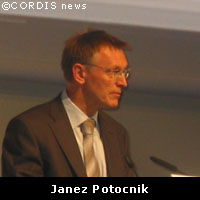New instrument to boost access to finance for 'risky' projects
The European Commission and European Investment Bank (EIB) have launched a new financial instrument to support research and innovation in Europe. The new Risk-Sharing Finance Facility (RSFF) is designed to improve access to financing for the promoters of research and innovation projects. Currently the uncertain, risky nature of these initiatives makes it harder for them to attract financing. The RSFF will address this challenge by sharing the underlying risks between the EIB and the EU. The Commission and the EIB will each put €1 billion into the fund over the period 2007-2013, with the Commission's contribution coming from the Seventh Framework Programme (FP7). All legal entities, including small and medium-sized enterprises (SMEs), larger companies, research organisations and Joint Technology Initiatives (JTIs), can benefit from the funds. By boosting the ability of the EIB to provide loans for research and innovation projects, the RSFF will unlock billions of additional financing from the private sector for these activities. The agreement establishing the facility was signed by European Research Commissioner Janez Potocnik at the European Conference on Research Infrastructures in Hamburg, and by the EIB President Philippe Maystadt at the annual meeting of the EIB Board of Governors in Luxembourg. 'RSFF is the demonstration of a very effective cooperation between two EU institutions to support European competitiveness,' said Mr Maystadt. 'By targeting higher risk financing in support of research and innovation projects, the facility will in an efficient way complement the existing support instruments including national and EU grants as well as market debt and equity funding.' Speaking at the European Conference on Research Infrastructures in Hamburg, Commissioner Potocnik described the RSFF as 'a major innovation in FP7'. 'It is a good example of how you can do more with less,' he added. The RSFF was set up following a request from the European Council in December 2005. A mid-term review of the initiative will be held in 2010. If demand for RSFF supported loans is lower than expected, the unused Commission contribution will be used to fund traditional FP7 grants.



